Andres Iniesta on why he still plays football, aged 38
- Published

Andres Iniesta is recognised as one of the great midfielders of his generation. He won the 2010 World Cup with Spain and four Champions Leagues with Barcelona, among countless other titles for club and country. He currently plays for Vissel Kobe in Japan. A new documentary charting his recovery from serious injury, My Decision, is out now on Rakuten TV.
Why do I still play football at the age of 38? Let me try to explain.
It boils down to three things - love, passion and excitement.
That is why I came back from serious injury in 2020 to continue playing in Japan, and it is the same reason that Lionel Messi, Cristiano Ronaldo and Luka Modric will be in Qatar, trying to win the World Cup at a similar age.
Everyone who has been playing football for as long as we have looks for those basic emotions in their lives.
There are different scenarios for every player as we get older, of course, but maybe people don't realise we all have this desire - a dream that drives us and enchantment for what we do.
We are lucky to do what we love. The day I don't feel the emotion of seeing a full stadium, or meeting the fans and my team-mates, is perhaps the day I shouldn't be playing any more and football is over.
I am not ready for that day yet. Neither are those other guys.
It will possibly be the last World Cup for all of them, but something else will come next and everyone, myself included, wants to see how these players evolve.
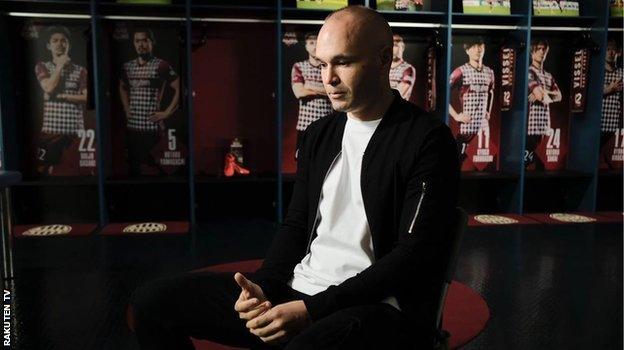
Iniesta speaks candidly about his emotions during his recovery from injury in My Decision
'The World Cup will be different for me this time'
Some things have changed in my life already - this World Cup will be the first since 2002 I will be watching, rather than trying to win it with Spain.
It will be very different this time but I am happy all the same.
It helps that I have not been in the national team for some time - I retired from international football after Russia 2018, so I have already had the process of going from being a player to being a fan.
The World Cup is always something incredible, and I will enjoy this tournament in a different way - watching Spain with my friends, my family and my children, which is something I have not done before.
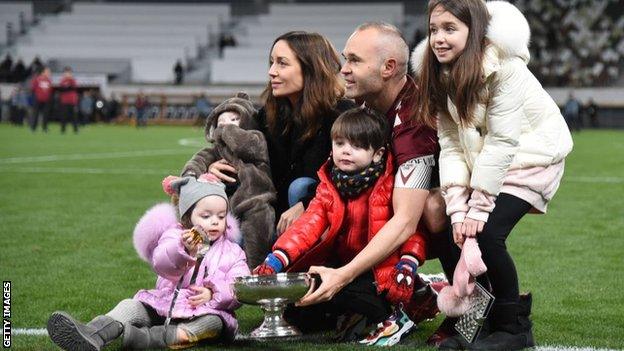
Iniesta and family after Vissel Kobe won the Emperor's Cup in 2020. The documentary shows the part they play in helping him return to fitness
I like this Spain team, and I know and appreciate the manager, Luis Enrique. I like what he is proposing and we have some great players.
They need to find consistency but, if they do find their rhythm, I believe Spain is a contender for the title. As a Spaniard, that's all I want - and I have faith in this team.
'You need to train your mind, just like you train your body'
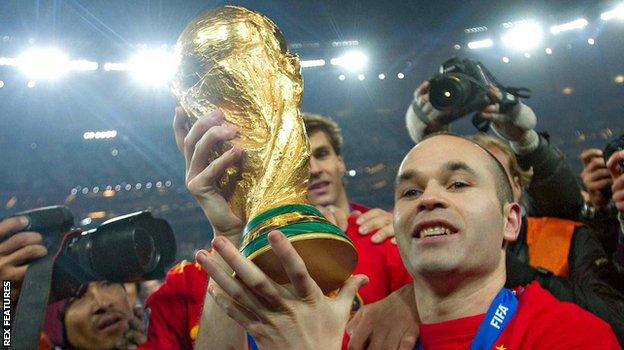
Iniesta celebrates with the World Cup trophy after Spain's triumph in 2010
One of the things I have learnt in my life is to always live in the moment. Right now, I am well - physically, in terms of playing football and also personally, with my mental health, but that has not always been the case.
Before the 2010 World Cup I went through a very difficult time with depression. The desire I mentioned earlier had gone - there were times when I had no desire to train, see my family or friends, or do anything.
The World Cup really saved me, but the situation I experienced really taught me a lot about how fragile the mind is.
'How To Win The World Cup' is available to stream now on BBC iPlayer
Getting through it made me a better person, more confident and mentally more mature. All of this was very useful in other situations in my life, not just on the football pitch.
I realised you need to train your mind, just like you train your body. It's still the same for me now, to face difficult situations in everyday life.
I look back at that period in life as a real turning point for me, and I would use it as an example for other players or people who are having problems, to show why they should have hope.
There was a time when the months were dark, after my friend Dani Jarque died in 2009, but it ended with a truly magical moment - me scoring the winner for Spain in the 2010 World Cup final.
That is what I would tell any people who are struggling now - that the worst moment of your life can be followed by the most important moment in your life.
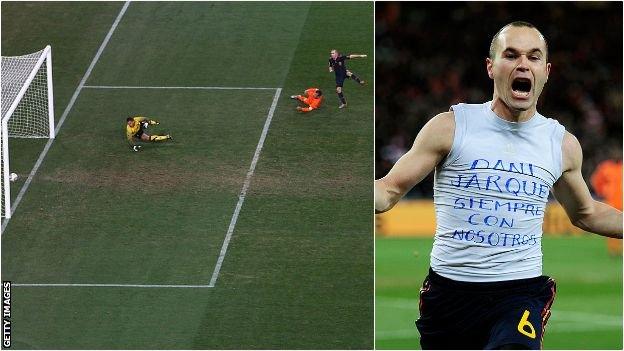
Iniesta dedicated his winning goal in the 2010 World Cup final to former team-mate Dani Jarque, who died earlier that season
I learned how you need strength to overcome difficult moments but also humility - you have to ask for help when necessary, because individually we are weaker than when we are part of a team.
Getting that help allowed me to get my desire back and, with a positive mentality, you can learn and overcome anything.
I struggled but I had a very strong engine - the engine of my life is football, and this engine pulled me through and allowed me to live one of the most important moments of my life.
'A moment of reckoning'
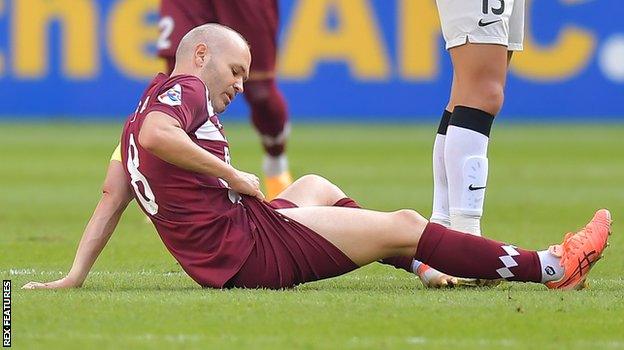
Iniesta sustained his thigh injury during Vissel Kobe's tie against Shanghai SIPG in the last 16 of the 2020 Asian Champions League, but made it worse when he came off the bench in extra time of their quarter-final against Suwon Bluewings a few days later and took the first penalty in the shoot-out that saw his side reach the semi-finals
Coming through that earlier experience definitely helped me when I tore my rectus femoris muscle playing for Kobe.
For me, that moment of injury was a very complicated moment to accept. It was a moment of reckoning - I was 36, and I did not know what would happen in the future.
From day one, I only thought of recovering and being a footballer again, but I did not know if I could, or how long that would take.
It was quite a personal process and it is usually a private one for players but I wanted to show honestly in my film all the phases and emotions I went through.
It is a sports documentary but also an educational one - people can see the protocol I followed to get back to full fitness and also all the work that was involved.
I was fortunate to make a full recovery, physically, but if you watch it you will understand that is not the only positive aspect of the film.
My mental health was just as important at this time too. I had my team - my family, and people I trusted, and with whom I could communicate my feelings.
There were good days and bad days, but I always had a positive frame of mind, and it is the same now.
I am aware I don't have a lot of years ahead of me in football but I am trying to live in the present and enjoy it.
I will end my playing career on my own terms, and the future? It will come.
Andres Iniesta was speaking to BBC Sport's Chris Bevan.
If you have been affected by issues raised in this article, there is information and support available on BBC Action Line.

Are natural deodorants healthier? Sliced Bread breaks into a sweat to find out
'He isn't the monster people think': The fascinating story of 'Michael X' - a preeminent Black Power leader of his age
